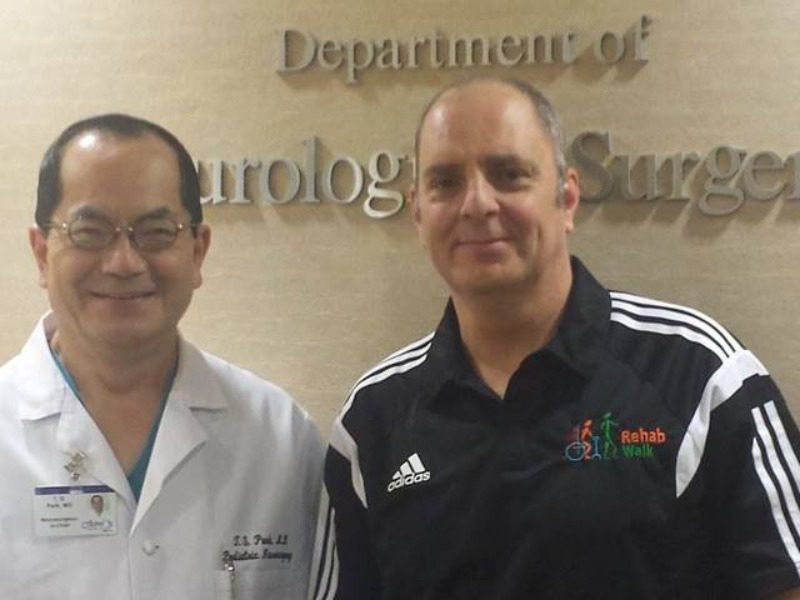Our approach is multifaceted. We begin with a thorough assessment, ensuring that we understand the unique needs and goals of each individual. Pre-SDR, we focus on optimising muscle tone and function to prepare the body for the procedure. Post-SDR, our dedicated team works tirelessly to facilitate recovery, enhance mobility, and maximise the potential for every client.
We recognise that SDR is just one part of the equation. Our holistic approach encompasses not only the physical aspects but also the emotional and psychological well-being of our clients. We provide unwavering support, empowering individuals to regain control of their lives and set new milestones for themselves.

Amanda Hoadley
Selective Dorsal Rhizotomy (SDR) Pre and Post Rehabilitation: A Comprehensive Approach to Enhanced Mobility and Independence
Selective Dorsal Rhizotomy (SDR) is a transformative surgical procedure that can significantly improve the lives of individuals with conditions like cerebral palsy. At Rehab Walk, our specialised SDR rehabilitation program is designed to support individuals both before and after the SDR procedure, with a focus on optimising mobility and promoting independence.
Let’s delve into the pre and post-rehabilitation aspects of SDR:
Pre-SDR Rehabilitation: Preparing for Success
Before undergoing SDR, it’s crucial to prepare the body to maximise the benefits of the procedure. Our pre-SDR rehabilitation program encompasses several key elements:
Assessment and Goal Setting
We start by conducting a comprehensive assessment of the individual’s physical condition, functional limitations, and personal goals. This assessment forms the basis of a personalised rehabilitation plan.
Optimising Muscle Function
SDR targets specific nerves in the spinal cord to reduce spasticity (muscle stiffness). To ensure the best possible outcome, we work on optimising muscle tone and function before the surgery. This involves tailored exercises and therapies to improve muscle strength and flexibility.
Enhancing Mobility
Preparing for SDR involves focusing on mobility and functional skills. We help individuals improve their ability to perform daily activities, such as walking, standing, or sitting, to ensure a smoother transition post-surgery.
Education and Support
We provide comprehensive education to both the individual and their family, explaining the SDR procedure and what to expect during the recovery period. We aim to alleviate concerns and create a supportive environment for the upcoming journey.
Post-SDR Rehabilitation: Nurturing Recovery and Independence
After the SDR procedure, the real work of rehabilitation begins. Our post-SDR rehabilitation program is geared towards facilitating recovery, enhancing mobility, and promoting independence:
Early Mobilisation
We initiate rehabilitation as soon as the individual is medically cleared, typically within days of the surgery. Early mobilisation is essential to prevent complications and maintain joint flexibility.
Gait Training
Regaining the ability to walk independently is a primary goal for many SDR patients. Our team specialises in gait training, working to improve walking patterns, balance, and co-ordination.
Muscle Strengthening
While SDR reduces spasticity, muscle weakness may still be present. We implement targeted strengthening exercises to build muscle tone and enhance overall physical function.
Functional Skills
Our rehabilitation program extends beyond basic mobility to focus on improving daily functional skills. This includes activities like dressing, self-care, and transferring from one surface to another.
Assistive Devices and Adaptive Techniques
We introduce assistive devices and teach adaptive techniques to promote independence in daily life. This may involve the use of mobility aids, orthotics, or adaptive tools.
Assistive Devices and Adaptive Techniques
SDR and post-rehabilitation can be emotionally challenging. We provide psychological support to individuals and their families, helping them cope with the psychological aspects of the journey.
Follow-up Care
Our commitment to individuals extends beyond the initial rehabilitation period. We offer long-term support, regular follow-up assessments, and adjustments to the rehabilitation plan as needed.
Contact us for further information